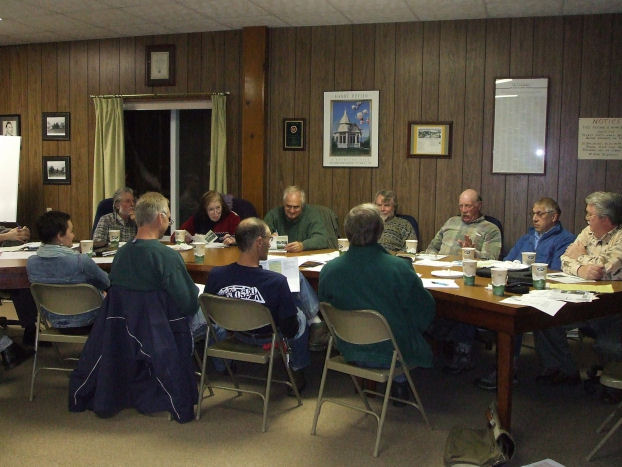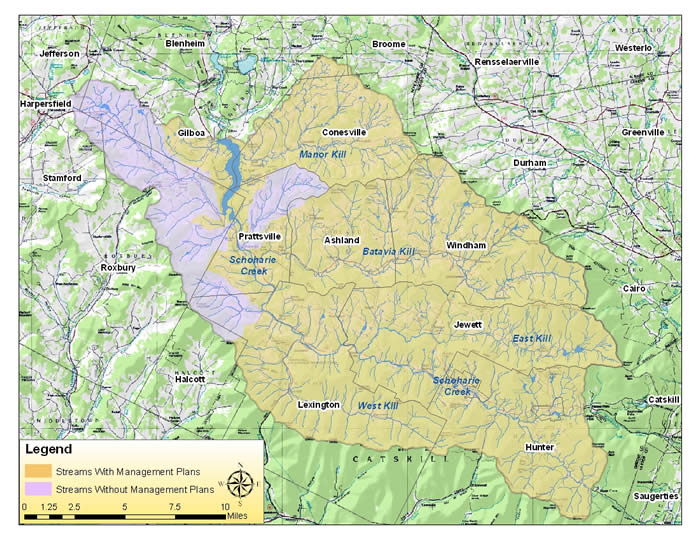Schoharie Watershed Advisory Committee
Schoharie Watershed Program
 Whether you live along a stream or not, you are affected by stream processes and the decisions that are made to address streams, wetlands and floodplains. The Schoharie Watershed Program was initiated to assist Schoharie watershed communities with stream and floodplain management, as well as stormwater runoff through projects and programs that restore stream channel stability, reduce erosion, promote awareness and understanding of stream systems, and mitigate stormwater runoff utilizing innovative practices. The Schoharie Watershed Advisory Committee provides the forum for municipalities, agencies and non-profits to work collaboratively on watershed efforts that benefit both water quality and the watershed communities. All watershed towns within Greene County have adopted Stream Management Plans and Stream Stewardship Principles, signed Memoranda of Understanding with Greene County Soil & Water Conservation District and have assigned representatives to the Schoharie Watershed Advisory Committee. For a SWAC brochure click here.
Stream Management Plan Implementation
Guided by stream stewardship principles, the Schoharie Watershed Program offers assistance to local communities, residents, and organizations to advance recommendations from Schoharie Basin Stream Management Plans. Stream Management Plans have been written for the Schoharie Creek, West Kill, East Kill, Batavia Kill and Manor Kill. To learn more about what adoption of a stream management plan entails, please click here. We also have a sample of a memorandum of understanding between a town and Soil and Water Conservation District to illustrate how a town could move forward with plan implementation. Finally, the SWAC, GCSWCD and NYCDEP utilize an annual action plan to organize their workload and priorities.
Stream Stewardship Principles (principles with additional text)
Management of natural stream systems often results in the perception of competing or inconsistent
goals and objectives. Using sound, science-based principles, stream managers will find it easier to
guide their work, and achieve a common ground between landowners, municipalities, regulatory
agencies and others that play an important role in the health of our Catskill stream systems. These
guiding principles set a common framework upon which stream managers may carry out their
important activities:
* We will work to protect and restore the environmental services provided by our streams and
floodplains;
* We will work to protect and restore the health of our stream and floodplain ecosystems;
* Wherever possible, we will manage streams so as to maintain their naturally effective channel
form and function;
* Wherever possible, we will manage floodplains as part of the natural stream system;
* Wherever possible, we will protect and restore mature forest in the riparian buffer;
* As we manage streams to protect public safety and investments in infrastructure, our actions in one location shouldn’t compromise the health of the stream upstream or downstream, or threaten the adjacent upland ecosystem through which the stream runs;
* We will strive to keep abreast of the state-of-the-science and best management practices related to streams and floodplains;
* We celebrate the role streams play in the natural heritage of our communities.
Who is eligible for assistance from the Stream Management Plan Implementation Program?
Local municipalities, watershed residents and property owners, schools, and not-for-profit organizations that promote watershed programming.
What projects are eligible?
Projects that are located within the Schoharie Basin, fall within a municipality that has adopted the appropriate stream management plan, follow the Stream Stewardship Principles and are consistent with the Stream Management Plans. Projects located in Johnson Hollow, Bear Kill, Huntersfield Creek and the Little West Kill are eligible since stream management plans have yet to be completed in these watershed (See map below).
Have a project idea?
The first step in the process is to research whether your proposed project fits with the stream stewardship principles outlined above, and is consistent with the recommendations set forth in the relevant stream management plan. Then, contact the Greene County Soil and Water Conservation District to discuss your proposed project: 518-622-3620 or abbe@gcswcd.com. They will assist you with completing the application:
Click here for an application for funding

Categories of funding and examples
Recreation and Stream Habitat Improvements: improving public stream access, parking, low impact trails along streams, fisheries and habitat.
Education on Watershed Protection: workshops, newsletters, public meetings, school programs, stream clean ups, volunteer plantings, educational kiosks, outreach materials and training.
Highway and Infrastructure Improvement: upgrade undersized culverts, use of higher quality road abrasives, incorporate vegetation into road embankments, properly manage utility crossing and floodplains.
Planning & Assessment: linking community plans & policies to water quality projects including floodplain management, coordinated flood response, technical assistance, economic development initiatives (e.g., stream celebrations), local environmental policies, and initiatives that encourage county, regional and local level support of watershed communities.
Landowner Stream Assistance: property management erosion prevention plans, access to planting materials to enhance riparian buffers, invasive species control, and land stewardship practices.
Creative Stormwater Practices & Critical Area Seeding: hydroseeding of open ditches, stormwater techniques to infiltrate water into ground, wetland enhancement, filter strips, creation of rain gardens & bioswales to manage stormwater, and projects that involve working proactively with municipalities, property owners, and developers to leverage funding for creative stormwater projects.
Schoharie Watershed Advisory Committee Membership
There are 15 appointed representatives on the SWAC, including a representative from each of the eleven municipalities in the watershed, a highway/infrastructure subcommittee representative, an education/outreach subcommittee representative, a representative from a recreation/habitat subcommittee and a Greene County Legislator. Advisory members include non-profit organizations working in the basin (e.g., Trout Unlimited, Cornell Cooperative Ext. of Greene Co., the Mountaintop foundations, to name a few), regulatory agencies, NYCDEP and County Soil & Water Conservation Districts and Planning Departments. Advisory members are available to assist the Committee as needed, as well as serve as potential project sponsors. The Greene County Soil and Water Conservation District provides the primary staffing for the SWAC. The SWAC meets approximately every two months and meetings are open to the public.
| Appointed SWAC Representatives |
| Name |
Affiliation |
| Erik Allan |
Highway/Infrastructure Subcommittee |
| Judd Weisberg |
Recreation/Habitat Subcommittee |
| Elizabeth LoGuidice |
Education/Outreach Subcommittee |
| Nancy Allen |
Town of Hunter |
| Dennis Lucas |
Town of Hunter—Alternate |
| Lynn Byrne |
Town of Lexington |
| Beverley Dezan |
Town of Lexington—Alternate |
| Eric Dahlberg |
Town of Conesville |
| Mike Brandow |
Town of Conesville-Alternate |
| Larry Gardner |
Greene County Legislator |
| Mike Tancredi |
Village of Hunter |
| Allan Higgins |
Village of Hunter– Alternate |
| James Hitchcock |
Greene County Legislator |
| Linda Kline |
Village of Tannersville |
| Mike McCrary |
Town of Jewett |
| Joseph Farleigh |
Town of Roxbury |
| Tom Hynes |
Town of Roxbury– Alternate |
| Kory O’Hara |
Town of Prattsville |
| Richard Morse |
Town of Prattsville—Alternate |
| Janet Orlando |
Town of Gilboa |
| Rebecca Wilburn |
Town of Gilboa—Alternate |
| Steve Walker |
Town of Windham |
| Don Murray |
Town of Windham-Alternate |
SWAC Meeting Minutes
Schoharie Watershed Advisory Committee
May 2008 June 2008 October 2008
February 2009 March 2009 September 2009
October 2009 March 2010 October 2010
March 2011
June 2011 November 2011
June 2012
October 2012 March 2013
August 2013
December 2013
SWAC Education and Outreach Subcommittee
December 2008 October 2009 June 2010
January 2011
SWAC Habitat and Recreation Subcommittee
December 2008 July 2010 February 2011
SWAC Highway and Infrastructure Subcommittee
April 2009 December 2009 March 2011
SWAC Stream Management Implementation Grant Program
Summary of Grants Funded To-Date
Additional Information
Contact Michelle Yost, Greene County Soil and Water Conservation District,
Watershed Assistance Program at (518)-589-6871 or
michelle@gcswcd.com, or David Burns, NYCDEP at (845)-340-7850 or dburns@dep.nyc.gov.
|

